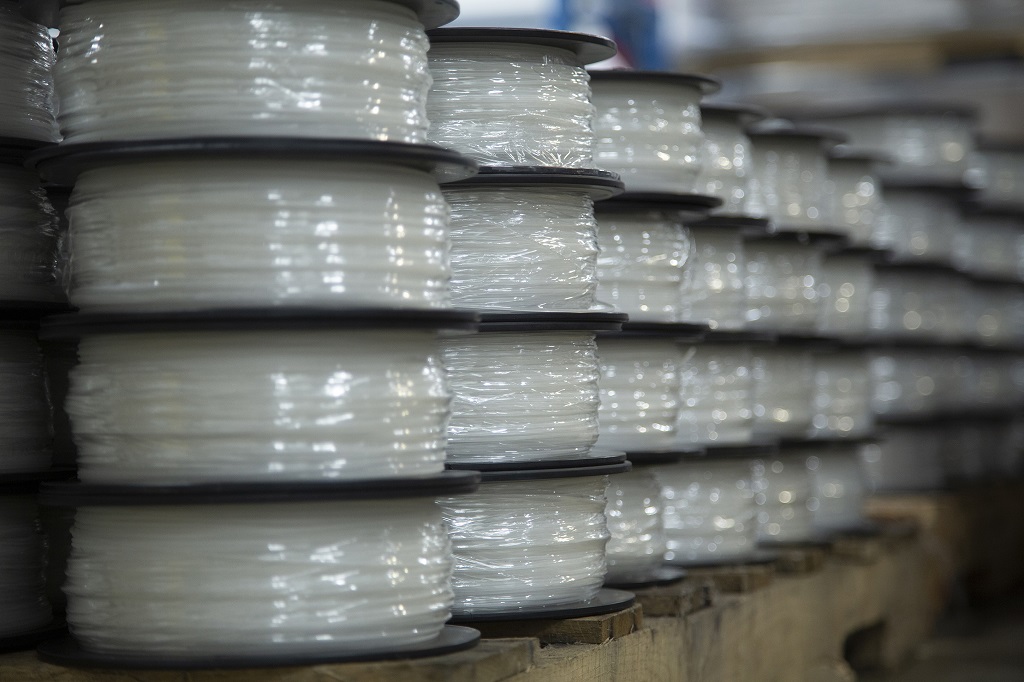![Pallets of Jabil Engineered Material in filament form are prepared for shipment to Jabil customers and distribution partners. [Image: Jabil]](https://fabbaloo.com/wp-content/uploads/2020/05/EngineeredMaterials_img_5eb09e416f761.jpg)
Product solutions mainstay Jabil introduces its next step forward in industrializing 3D printing: Engineered Materials.
Four years ago, the company turned laser focus on 3D printing — primarily how to take the tech to additive manufacturing. Serial production and scale operations require certain realities that 3D printing is still working toward, and the ecosystem required for full additive manufacturing is only now beginning to appear. Work with high-profile partners in the 3D printing industry, like HP, has built up a strong foundation of expertise at Jabil.
Today Jabil is announcing a step forward with a fully integrated MPM approach: materials, processes, and machines. These three components comprise an interconnected ecosystem necessary for additive manufacturing. Focusing now on the “materials” side of MPM, the new Engineered Materials solution is set to speed up the innovation of additive manufacturing materials.
“Jabil is taking advantage of its rich history in materials science innovation to advance the entire additive manufacturing market forward and produce custom materials in weeks—not months. Our ability to integrate new engineered materials into our ecosystem of 3D printers and rigorous processes will transform a new generation of additive manufacturing applications, including those for heavily regulated industries, such as aerospace, automotive, industrial and healthcare,” said John Dulchinos, Vice President of Digital Manufacturing, Jabil.
I spoke with Dulchinos and the Jabil team for a deeper look at what the announcement means for the company; more on that later.
Jabil is serious about shortening the timeline for materials development for some serious 3D printing. Evaluating, qualifying, and validating materials — with certified processes and machines (MPM, remember) — will “[ensure] greater availability of unique materials while reducing time-to-market and cost to produce the highest quality parts,” the company says. The comprehensive approach will be based at a new Materials Innovation Center outside of Minneapolis, Minnesota. This puts it “right in the heart of what we think of as polymer country,” Dulchinos told me.
Fast-paced development for fully validated materials will encompass, according to Jabil’s announcement, “polymer formulations, compound development and ISO 9001 Quality Management System (QMS) certification.” Powders and filaments will be created in this new facility, ready for use in FFF, SLS, HSS, and MJF equipment.
Critically, the materials will be open source.
Jabil sees its activities as beneficial for the entire industry’s development. Sure, they make sense from a business perspective for a large and profitable company — but they don’t exist in a vacuum. For 3D printing to continue to develop on a global scale — on a manufacturing scale — innovations need broad reach.
Jabil Engineered Materials will offer a fast path to new polymeric materials including those with value-added attributes like being:
-
Conductive
-
Lubricated
-
Electrostatic dissipative (ESD)
-
Flame retardant
-
UV stable
-
Reinforced
Print profiles will be made available for Jabil Engineered Materials via Ultimaker Cura, which has seen an expansion of print profiles for third-party companies.
Today’s announcement is of a ready-for-market solution; first shipments begin this week. In addition to internal work for its customers, Jabil is working with Chase Plastics and Channel Prime Alliance as distribution partners.
Materials development is a huge part of the story of additive manufacturing — and of course there’s more to it for Jabil. So I spoke with Dulchinos and Matt Torosian, Director of Product Management, Jabil Additive, for more detail; check out our interview here.
Via Jabil











An inventive designer has developed a method for producing 3D paper objects using recycled paper and 3D printed molds.